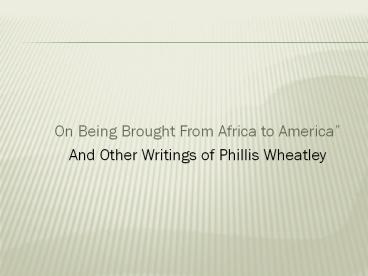On Being Brought From Africa to America
1 / 10
Title: On Being Brought From Africa to America
1
- On Being Brought From Africa to America
- And Other Writings of Phillis Wheatley
2
(No Transcript)
3
Background on Phillis Wheatley
- Phillis WheatleyPhillis Wheatley was the author
of the first book of poetry by an African
American, published in London in 1773. Prior to
the book's debut, her first published poem, "On
Messrs Hussey and Coffin," appeared in 1767 in
the Newport Mercury. In 1770, her elegy on the
death of George Whitefield, a celebrated
evangelical Methodist minister who had traveled
through the American colonies, drew international
attention and the particular interest of Selina
Hastings, the Countess of Huntingdon. Whitefield
had been the Countess's personal chaplain.
Wheatley published numerous individual poems in
addition to her book, Poems on Various Subjects,
Religious and Moral, but a proposed second volume
of poetry never appeared, and the manuscript was
lost after her death in 1784. - Her Early Life
- Born in West Africa about 1753, Wheatley was
named for the slave ship, the Phillis, that
brought her to Boston on 11 July 1761, and the
Wheatley family who purchased her from the slave
trader John Avery. John Wheatley was a prominent
Boston merchant with a wholesale business, real
estate, warehouses, wharfage, and the schooner
London Packet. Susannah Wheatley was an ardent
Christian and admirer of George Whitefield. A
frail child between seven and eight years old,
Phillis was chosen to be a domestic servant and
companion to Mrs. Wheatley in her later years.
Although she spoke no English upon her arrival in
this country, she soon proved to be a precocious
learner, and was tutored by the Wheatley's
daughter Mary in English, Latin, history,
geography, religion, and the Bible in particular.
She was treated more as a member of the family
than a servant or slave, and her education was
that of a young woman in an elite Boston family.
She was particularly well-acquainted with the
classics, the Bible, and contemporary works,
especially those of Alexander Pope, and these
influences are readily apparent in her writing.
4
Background on Phillis wheatley
- Fame and Misfortune
- Phillis's debut volume of poetry was first
proposed in 1772, but this early venture was
unsuccessful, and eventually she turned to an
English publisher for her Poems on Various
Subjects, Religious and Moral. In May of 1773 she
accompanied the Wheatley's son Nathaniel to
England, where plans for the publication had
begun, but she was called home by the illness of
Mrs. Wheatley, and departed before the book
appeared in September. While she met many
notables in London, she was unable to see the
Countess of Huntingdon, who was away in Wales for
the summer. Shortly after her return to Boston,
Phillis was freed by her master, possibly under
pressure from her English admirers. Mrs. Wheatley
died in March of 1774, and Phillis's life from
that point was plagued by ill health and an
unhappy marriage. She drew up proposals for a
second volume of poetry which was never
published, probably due to wartime shortages in
Boston. Her marriage in 1778 to John Peters, a
free African American living in Boston, produced
three children, two of whom soon died. By 1784
she was living in a boardinghouse, and, in
December of that year, she and her remaining
child died and were buried in an unmarked grave. - Massachusetts Historical Society
5
On Being Brought from Africa to America 'Twas mercy brought me from my Pagan land, Taught my benighted soul to understand That there's a God, that there's a Saviour too Once I redemption neither sought nor knew. Some view our sable race with scornful eye, "Their colour is a diabolic die." Remember, Christians, Negro's, black as Cain, May be refin'd, and join th' angelic train. Phillis Wheatley
6
Ode To Neptune On Mrs. W-----'s Voyage to England. I. WHILE raging tempests shake the shore, While AElus' thunders round us roar, And sweep impetuous o'er the plain Be still, O tyrant of the main Nor let thy brow contracted frowns betray, While my Susanna skims the wat'ry way. II. The Pow'r propitious hears the lay, The blue-ey'd daughters of the sea With sweeter cadence glide along, And Thames responsive joins the song. Pleas'd with their notes Sol sheds benign his ray, And double radiance decks the face of day. III. To court thee to Britannia's arms Serene the climes and mild the sky, Her region boasts unnumber'd charms, Thy welcome smiles in ev'ry eye. Thy promise, Neptune keep, record my pray'r, Not give my wishes to the empty air. Phillis Wheatley
7
An Answer To The Rebus, By The Author Of These Poems THE poet asks, and Phillis can't refuse To show th' obedience of the Infant muse. She knows the Quail of most inviting taste Fed Israel's army in the dreary waste And what's on Britain's royal standard borne, But the tall, graceful, rampant Unicorn? The Emerald with a vivid verdure glows Among the gems which regal crowns compose Boston's a town, polite and debonair, To which the beaux and beauteous nymphs repair, Each Helen strikes the mind with sweet surprise, While living lightning flashes from her eyes, See young Euphorbus of the Dardan line By Manelaus' hand to death resign The well known peer of popular applause Is C----m zealous to support our laws. Quebec now vanquish'd must obey, She too much annual tribute pay To Britain of immortal fame. And add new glory to her name. Phillis Wheatley
8
http//www.masshist.org/ Letter from Phillis
Wheatley to Mary Wooster A Poem of the Death of
Charles Eliot To His Honor the Lieutenant
Governor on the death of his Lady To the Right
and Honorable William, Earl of Dartmouth
9
(No Transcript)
10
Reflect on one poem that you read today that left
an impression on you. Tell why you chose the
poem and explain how you feel about its message.































